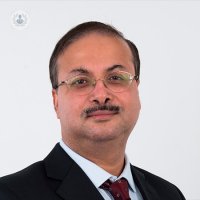What to expect from a colonoscopy
Autore:If you notice any unusual symptoms involving a change in your bowel habits, it would be a good idea to have your bowel inspected with a colonoscopy.
We spoke to leading gastroenterologist, Dr Debasis Majumdar, who let us know what this procedure is exactly, how your family's medical history can determine whether you should have a colonoscopy, how to prepare, and whether it's painful.

What is a colonoscopy?
It's basically a camera test to check the inside of your large bowels. We insert a camera with a light, and lens source through the back passage into the large bowel. We even have the ability to get into the terminal part of the small bowel and can inspect the entire colon. We can take a biopsy and view pathologies. We take biopsies to be inspected. If we find any warty overgrowths or colonic polyps, then during the tests, we can remove the polyps.
Why is a colonoscopy done usually?
A colonoscopy is usually done due to various symptoms, which may include unusual bowel habits. This may be a patient with onset diarrhoea, constipation, significant pain, blood with stool. Sometimes, there's a strong family history of bowel cancer that makes you more likely to get it. In this subgroup, we would carry out a colonoscopy to check the bowels even if patients don't have symptoms.
What does a colonoscopy detect? (aside from colon cancer)
Colonoscopy can detect any abnormality that can happen in the lining of the bowel, and polyps. It can help highlight characteristics of inflammatory bowel disease, and can find other causes of diarrhoea, weight loss, pain in the abdomen. It can detect benign conditions. It can detect causes of rectal bleeding and pain, like haemorrhoids and anal fissure.
How can I prepare for a colonoscopy?
You would need to get good guidance. Generally, we request patients to take a day off before the test. This is due to how patients would need to have laxatives to clear their bowels. Patients shouldn't eat any fibre as it leaves a lot of residue; we ask patients not to eat anything from midnight the day before and recommend they drink fluids to avoid dehydration. We recommend a change in medication, such as blood thinners, at times.
After the procedure, we observe the patient and we let them go with a report. We tell patients to eat a meal that is easily digestible, because they would have fasted for more than 12 hours. Patients can resume their normal lifestyle habits the next day.
We also give instructions with caution to look for any bleeding. If it's overt and continuous, then there is a number they can ring to get in contact. It's also recommended to ring if there is any unusual pain in the abdomen. In the case of continuous bleeding, it's important that patients go to their nearest accident and emergency department.
Does the procedure hurt?
It's not painful, but one would feel a bit of a bloated sensation and mild discomfort. Because the large bowel is used only for one way traffic, the bowel can go into cramp mode with a colonoscopy.
Are there any pain relief options?
One can have the procedure being completely conscious. In those cases, we offer Entonox or 'laughing gas’ to breathe in. It's totally patient-controlled medication, so they can adjust the amount needed to according to their discomfort.
Another option is to use an intravenous painkiller - one that doesn't knock out patients. It makes patients feel relaxed and also controls the cramps and the bloaty pain.
For more information on having a colonoscopy, we recommend booking an appointment with a leading gastroenterologist such as Dr Debasis Majumdar. Visit his Top Doctors profile today for more information.


